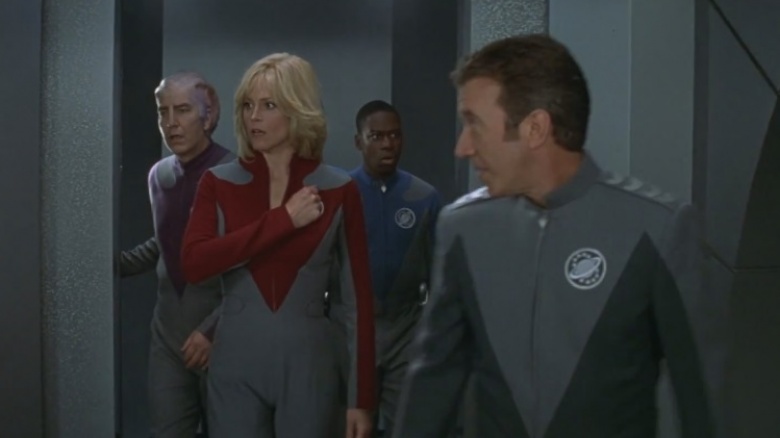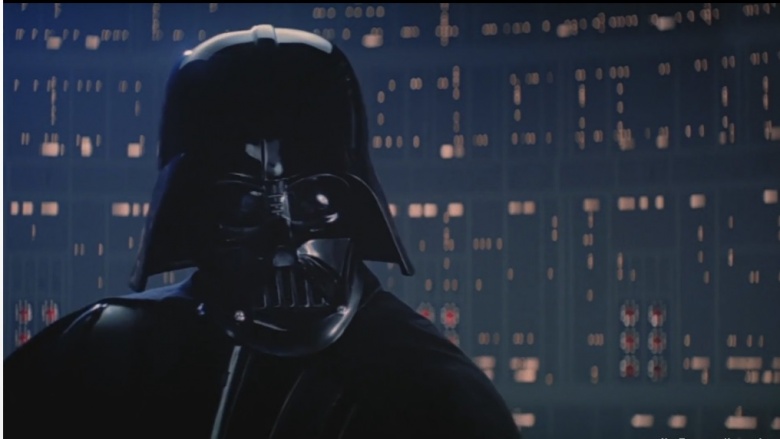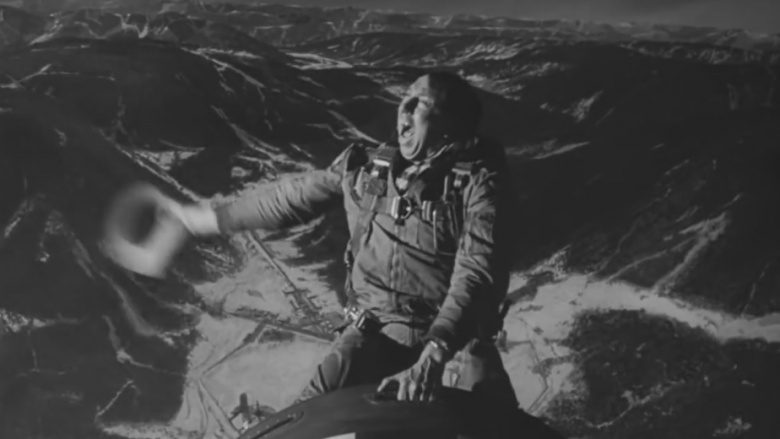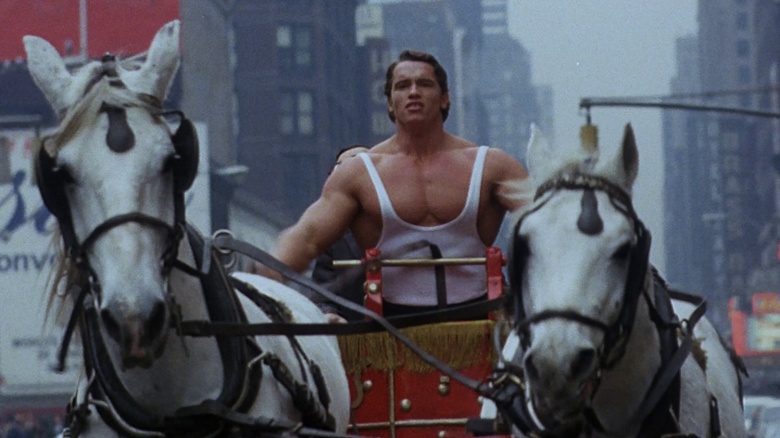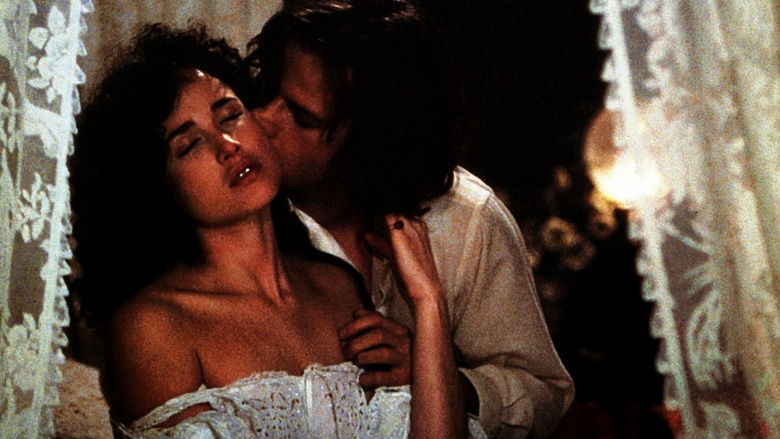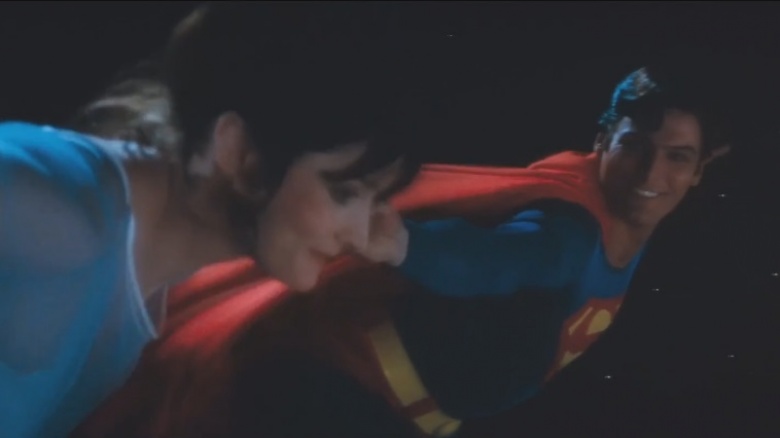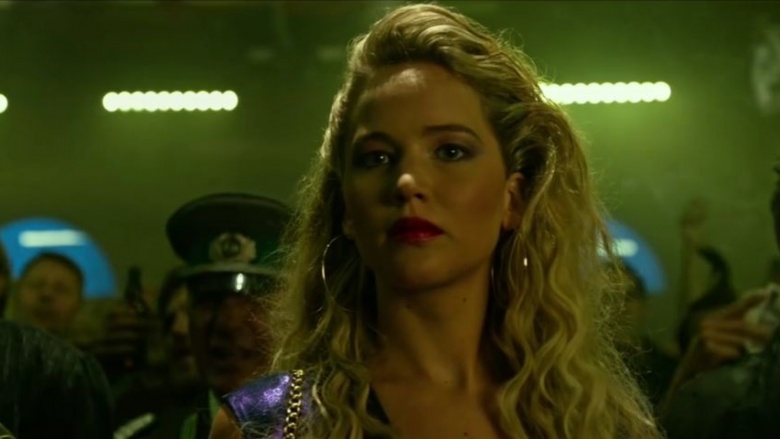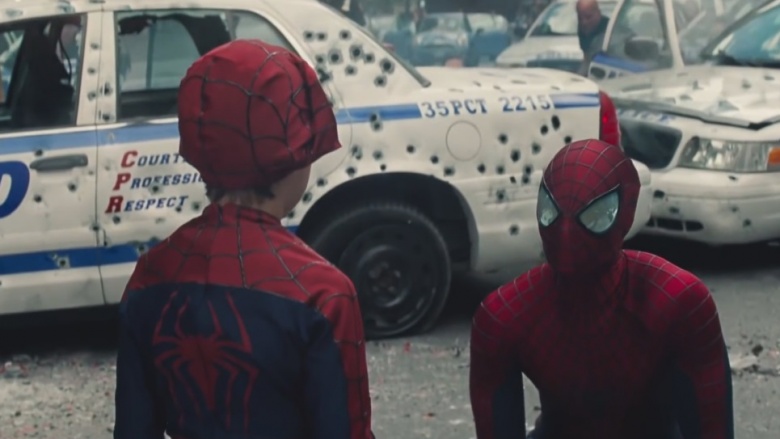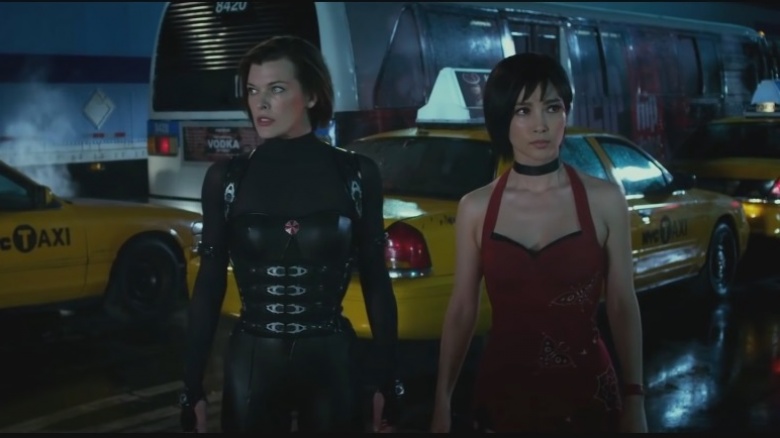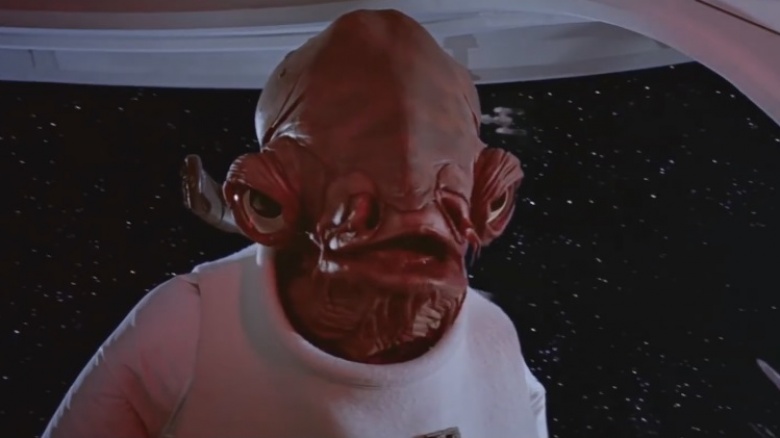Original Movie Lines You'll Never Get To Hear
Whether it's because of mistakes or last-minute changes, pretty much every movie is subjected to post-production alterations. One example of this sort of work is called ADR, automatic dialogue replacement, or simply dubbing, wherein actors re-record lines of dialogue they originally spoke on set inside the more controllable environment of a studio. While most of the time, actors are essentially lip-synching to their own performances, sometimes they're directed to say something entirely different. Sometimes it's even an entirely different actor, providing their own voice for another performer.
What happens to these performances as originally recorded? Well, have you ever heard the expression "left on the cutting room floor"? Such is the fate of countless hours of footage and hard work, some of which you'll never get to hear, and some that only surfaces years later. Take a look at what was really going down on the set during some of your favorite scenes.
Galaxy Quest (1999) - "Well, f*** that!"
Ask a Star Trek fan to name the best films in the franchise. If they're clever, they'll tell you Galaxy Quest is up pretty high on the list—and for the record, we enthusiastically agree. This adventure, a family-friendly fish-out-of-water jaunt through space, was originally scripted as a much more loose and lewd project, with the screenwriter on record as saying he wasn't trying to make a "family movie"—he was just trying to make himself laugh. So somewhere out there is a version of Galaxy Quest your parents probably wouldn't have let you see, with interspecies sexual content, decapitated heads, and more than a little bit of language.
While the movie is strong as is, one change from the original is a serious loss. In the "chompers" scene, when Tim Allen and Sigourney Weaver round a corner to face a hilariously lethal, totally unnecessary obstacle course, Weaver's response is easy to relate to: "Well, screw that!" But watch her lips—she's clearly saying something else. Screenwriter Robert Gordon, who had to watch a lot of jokes get excised from his script to meet the PG rating, is on record as calling it "the worst dubbed 'F-bomb' ever," and one almost thinks they let the lip sync slide on purpose, just to show that originally there was a better joke here. Still very funny!
The Empire Strikes Back (1980) - Wait, who killed my father?
Star Wars may well be among the best examples of a movie that was saved by post-production trickery. Being on the shoot itself and watching the filming unfold, it must have looked like it was going to be awful. Obviously, things worked out—for most people, with one exception being the man who played Darth Vader. In what may be the most infamous erased performance ever, David Prowse, the actor who wore Vader's suit on set in all three films, discovered to his horror at the premiere of the first movie that his vocals had been overdubbed. The perceived snub soured him on all the movies, and he's on record as saying "I've only got one favorite memory of filming Star Wars, and that is when my very first check arrived."
But while the performance as a whole was largely dubbed over word-for-word by James Earl Jones, there was one crucial line of dialogue that differed. We all know the big reveal in the Empire Luke and Vader duel comes in the form of the line "No, I am your father," but on set, people heard something remarkably different. In order to preserve the secret, closely guarded plot twist, a decoy line was used, with the real line entrusted by George Lucas and director Irvin Kershner to Mark Hamill alone. Instead of the words we heard, David Prowse followed the script, saying "Obi-Wan killed your father," and that's the line Mark Hamill is reacting to. He's the only actor on the production who knew the line would be changed, and considering how much anguish and pain he put into his performance, one has to wonder if other people on set thought he was selling the reveal a little too hard.
Dr. Strangelove (1964) - A pretty good weekend where?
Despite its absurdity, Dr. Strangelove is an enduring allegory for America's often-insane government, with the unhinged id of Major T. J. "King" Kong being a distinctly emblematic figure embracing a cowboy's brand of chaos. Flying a nuclear payload into Russian airspace, the Major remarks that "a fella could have a pretty good weekend in Vegas" with the contents of the aircraft crew's survival kits, which include gum, gold, tranquilizers and ammunition. Originally, the line was much more in-character for the Texas-style Major, referring instead to a weekend in Dallas.
Why the change for something so innocuous? Highly unique timing. Dallas had, of course, recently been the site of the assassination of President John F. Kennedy, and had occurred just two months before Dr. Strangelove's release. The nation was still in a state of shock and mourning, transitioning uneasily into leadership under Lyndon Johnson. It would be some time, the thinking goes, before audiences would be comfortable thinking of Dallas as a place for good times. Maybe it's for the better—Vegas has remained an American playground for 50 years and running. Dallas, though fun in its own way, is still Dallas.
Hercules In New York (1970) - Ahnold's heavy accent
Arnold Schwarzenegger is such a cultural fixture at this point that it's worth recalling how remarkably unlikely his ascendance really was. Despite his awesome charisma, in the early days you'd be forgiven for thinking he'd never make it as a movie star, because more often than not, English speakers could barely understand him. Even as late as 1982's Conan the Barbarian, Schwarzenegger had to work intensely with a dialect coach to penetrate his Austrian accent and approach a proper English inflection. Is it any surprise that the producers of 1970's Hercules in New York threw up their hands at the challenge and didn't even try?
Though now he's at the point where he can speak English without inflection if he feels like it, the dialogue he delivered for his first dramatic role was deemed so hard to understand that it was overdubbed entirely. And it would've likely stayed that way had Schwarzenegger not gone on to become the star he is today, but thanks to his enduring popularity, you can now hear his unaltered performance in new versions of the film. It doesn't even sound that bad, in retrospect. Maybe we just got used to it.
Greystoke (1984) - Introducing Anglenn MaCloseDowell
There are a number of ways to bring a script's characters properly to life. The first is casting for the part, choosing the right performer from a stable of many. The second is to have an actor alter their way of doing things, guiding them toward a more nuanced performance. The producers of Greystoke chose probably the most complicated route. In a most unusual move, the creative team behind the 1984 Tarzan picture decided against Andie MacDowell using her natural accent in her performance. But rather than coach her toward a different way of speaking, they just wrapped picture and had MacDowell's entire performance dubbed over by the more austere-sounding Glenn Close, a move that neither Close nor MacDowell appreciated. Can you blame them?
Superman (1978) - A showstopping musical number
The flying scene from the classic Richard Donner-directed Superman is the centerpiece of the movie, the most memorable part of a quite-good film. Playing right into the marketing angle ("you'll believe a man can fly!"), Superman (Christopher Reeves) takes Lois Lane (Margot Kidder) into the skies above Metropolis, and they soar majestically through the night air. The hokiest element of the scene is Margot Kidder's Shatner-esque spoken-word monologue, reciting some of the lyrics to the song "Can You Read My Mind" as she hovers in Superman's grasp, marveling at the powers of this strange and alien man.
Like the rest of the movie, it's earnest and a little bit corny. But it could've been unbelievably embarrassing. As originally conceived, Lois wasn't just supposed to recite lyrics, a dreamy conceit that works well in the moment. No, according to the DVD commentary, she was supposed to full-on sing, presenting a showstopping number from above the clouds. It's hard to imagine a decade in film when this wouldn't have been terrible. It's telling that though superhero movies are bigger than they've ever been, we've yet to have a big-budget comic book musical number—but hey, there's a first time for everything. Shall we turn the music up? What say you, Justice League?
X-Men Apocalypse (2016) : Mother and child confirmed?
Out of all the comic book properties floating around in today's moviescape, 20th Century Fox's X-Men franchise is easily the most hopelessly convoluted. Greater minds than ours have attempted to disentangle the overarching plot of these nine films (and counting), and recent fan theories constructed around the release of X-Men: Apocalypse have been based on the possibility of Mystique and Nightcrawler being closely related—mother and son, specifically.
Though this has been proven true in the comics, the movies are their own beast entirely, despite Mystique's fixation on the young teleporter in the mutants' most recent screen adventure. And as yet, there's been no official confirmation of the connection—sort of. About six minutes in to the gag reel, Jennifer Lawrence, talking in-character as Mystique to Hank McCoy, decides to throw the script out the window and introduce Nightcrawler with just the facts. "This is Kurt Wagner. He's my... illegitimate son from Azazel," she says, continuing rapidly until drowned out by laughter from the cast and crew, to whom the reveal doesn't seem to be much of a surprise. So who knows? Blooper reels aren't usually canonical, but this is X-Men, so anything goes. Regardless, going by the movie itself, this remains a fun theory—at least, until the next installment.
The Amazing Spider-Man 1 & 2 - With Great Power...???
As we sit on the cusp of a whole new and spectacular Spider-Man series, the Andrew Garfield-starring movies from the mid-aughts are looking more and more like an intriguing pair of misfires. There's the first, released far too close to the Sam Raimi-directed trilogy of the early 2000s to have an impact, and the second, an overstuffed and noisy clunker. There are good moments and performances throughout the films, but as a whole, they're unmemorable, and weirdly light on the webslinging antics, with too much time spent on the fringes of the story. In short, they feel lacking in what makes Spider-Man who he is.
One weird thing you'll never hear throughout the films? The classic line, "With great power comes great responsibility." It's a line on which the whole of the character hinges, defining who he is and why he does it, yet while it was alluded to, it's never spoken. Director Marc Webb cites several moments they considered using it, and the script for the second one had it baked into the ending, but the line ultimately never made it in. It's a weird thing to nitpick over until you remember that the philosophy it represents is as iconic as Spidey's red and blue suit.
Resident Evil: Retribution (2012) - The 'real' Ada Wong
The Resident Evil movies are a weird bunch no matter how you come to them. Controversial on its 2002 release for changing just about everything from the game series that inspired it, subsequent RE movies have shown a strange attitude toward their source material, arguably getting closer to the games as they've gone on with the addition of storylines straight from the video game universe, as well as characters like Albert Wesker, Jill Valentine, and Chris Hadfield.
They're still not faithful, but the adherence later movies in the soon-to-be-six-film-series show toward elements in the video games has been interesting—you'd think it would be easier for them to leave out everything and go their own way. This worked to the detriment of one actor in the surprisingly fun Resident Evil: Retribution. In an unusual move, the Chinese actress Li Bingbing played the assassin Ada Wong in the movie, but her voice was entirely re-recorded by the actress from the video games, Sally Cahill. It's an odd show of respect to the source material, if discouraging to Ms. Bingbing, dubbed over in one of her first and most high-profile Western roles.
Return of the Jedi (1983) - It's a... trick!
No character in the Star Wars universe is more memeable than Admiral Ackbar. The squid-faced military man, who carries an air of gravitas despite looking like a Muppet that was microwaved too long, can be recalled by most viewers for a single line of dialogue, uttered when the tide starts to turn against the Rebel Alliance during their final firefight against the Empire's new Death Star—"It's a trap!" Yes, indeed...and it's also not what he originally said. The original line, "It's a trick!", was changed in post-production, allegedly because it didn't have the oomph that the production wanted for the moment. It's a little difference, yes, but one that speaks volumes, for one reason or another. That famous line is one of the only things Ackbar says throughout the entire saga; if it were one percent different, would we even remember who he was?

